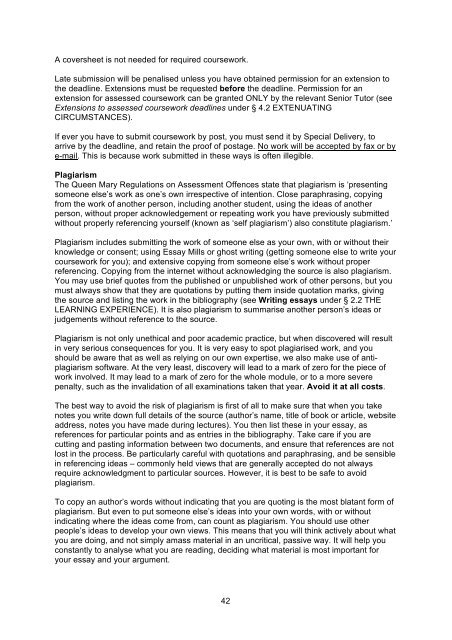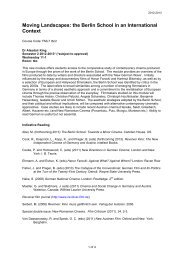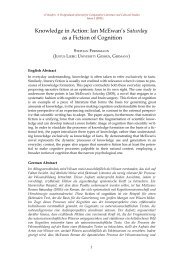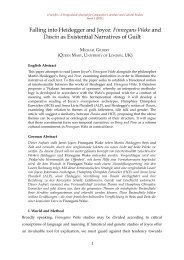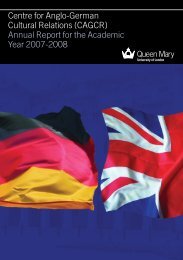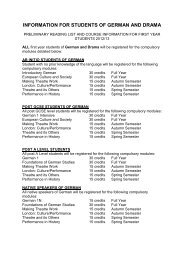Student Handbook - The School of Language, Linguistics and Film
Student Handbook - The School of Language, Linguistics and Film
Student Handbook - The School of Language, Linguistics and Film
You also want an ePaper? Increase the reach of your titles
YUMPU automatically turns print PDFs into web optimized ePapers that Google loves.
A coversheet is not needed for required coursework.<br />
Late submission will be penalised unless you have obtained permission for an extension to<br />
the deadline. Extensions must be requested before the deadline. Permission for an<br />
extension for assessed coursework can be granted ONLY by the relevant Senior Tutor (see<br />
Extensions to assessed coursework deadlines under § 4.2 EXTENUATING<br />
CIRCUMSTANCES).<br />
If ever you have to submit coursework by post, you must send it by Special Delivery, to<br />
arrive by the deadline, <strong>and</strong> retain the pro<strong>of</strong> <strong>of</strong> postage. No work will be accepted by fax or by<br />
e-mail. This is because work submitted in these ways is <strong>of</strong>ten illegible.<br />
Plagiarism<br />
<strong>The</strong> Queen Mary Regulations on Assessment Offences state that plagiarism is ‘presenting<br />
someone else’s work as one’s own irrespective <strong>of</strong> intention. Close paraphrasing, copying<br />
from the work <strong>of</strong> another person, including another student, using the ideas <strong>of</strong> another<br />
person, without proper acknowledgement or repeating work you have previously submitted<br />
without properly referencing yourself (known as ‘self plagiarism’) also constitute plagiarism.’<br />
Plagiarism includes submitting the work <strong>of</strong> someone else as your own, with or without their<br />
knowledge or consent; using Essay Mills or ghost writing (getting someone else to write your<br />
coursework for you); <strong>and</strong> extensive copying from someone else’s work without proper<br />
referencing. Copying from the internet without acknowledging the source is also plagiarism.<br />
You may use brief quotes from the published or unpublished work <strong>of</strong> other persons, but you<br />
must always show that they are quotations by putting them inside quotation marks, giving<br />
the source <strong>and</strong> listing the work in the bibliography (see Writing essays under § 2.2 THE<br />
LEARNING EXPERIENCE). It is also plagiarism to summarise another person’s ideas or<br />
judgements without reference to the source.<br />
Plagiarism is not only unethical <strong>and</strong> poor academic practice, but when discovered will result<br />
in very serious consequences for you. It is very easy to spot plagiarised work, <strong>and</strong> you<br />
should be aware that as well as relying on our own expertise, we also make use <strong>of</strong> antiplagiarism<br />
s<strong>of</strong>tware. At the very least, discovery will lead to a mark <strong>of</strong> zero for the piece <strong>of</strong><br />
work involved. It may lead to a mark <strong>of</strong> zero for the whole module, or to a more severe<br />
penalty, such as the invalidation <strong>of</strong> all examinations taken that year. Avoid it at all costs.<br />
<strong>The</strong> best way to avoid the risk <strong>of</strong> plagiarism is first <strong>of</strong> all to make sure that when you take<br />
notes you write down full details <strong>of</strong> the source (author’s name, title <strong>of</strong> book or article, website<br />
address, notes you have made during lectures). You then list these in your essay, as<br />
references for particular points <strong>and</strong> as entries in the bibliography. Take care if you are<br />
cutting <strong>and</strong> pasting information between two documents, <strong>and</strong> ensure that references are not<br />
lost in the process. Be particularly careful with quotations <strong>and</strong> paraphrasing, <strong>and</strong> be sensible<br />
in referencing ideas – commonly held views that are generally accepted do not always<br />
require acknowledgment to particular sources. However, it is best to be safe to avoid<br />
plagiarism.<br />
To copy an author’s words without indicating that you are quoting is the most blatant form <strong>of</strong><br />
plagiarism. But even to put someone else’s ideas into your own words, with or without<br />
indicating where the ideas come from, can count as plagiarism. You should use other<br />
people’s ideas to develop your own views. This means that you will think actively about what<br />
you are doing, <strong>and</strong> not simply amass material in an uncritical, passive way. It will help you<br />
constantly to analyse what you are reading, deciding what material is most important for<br />
your essay <strong>and</strong> your argument.<br />
42


